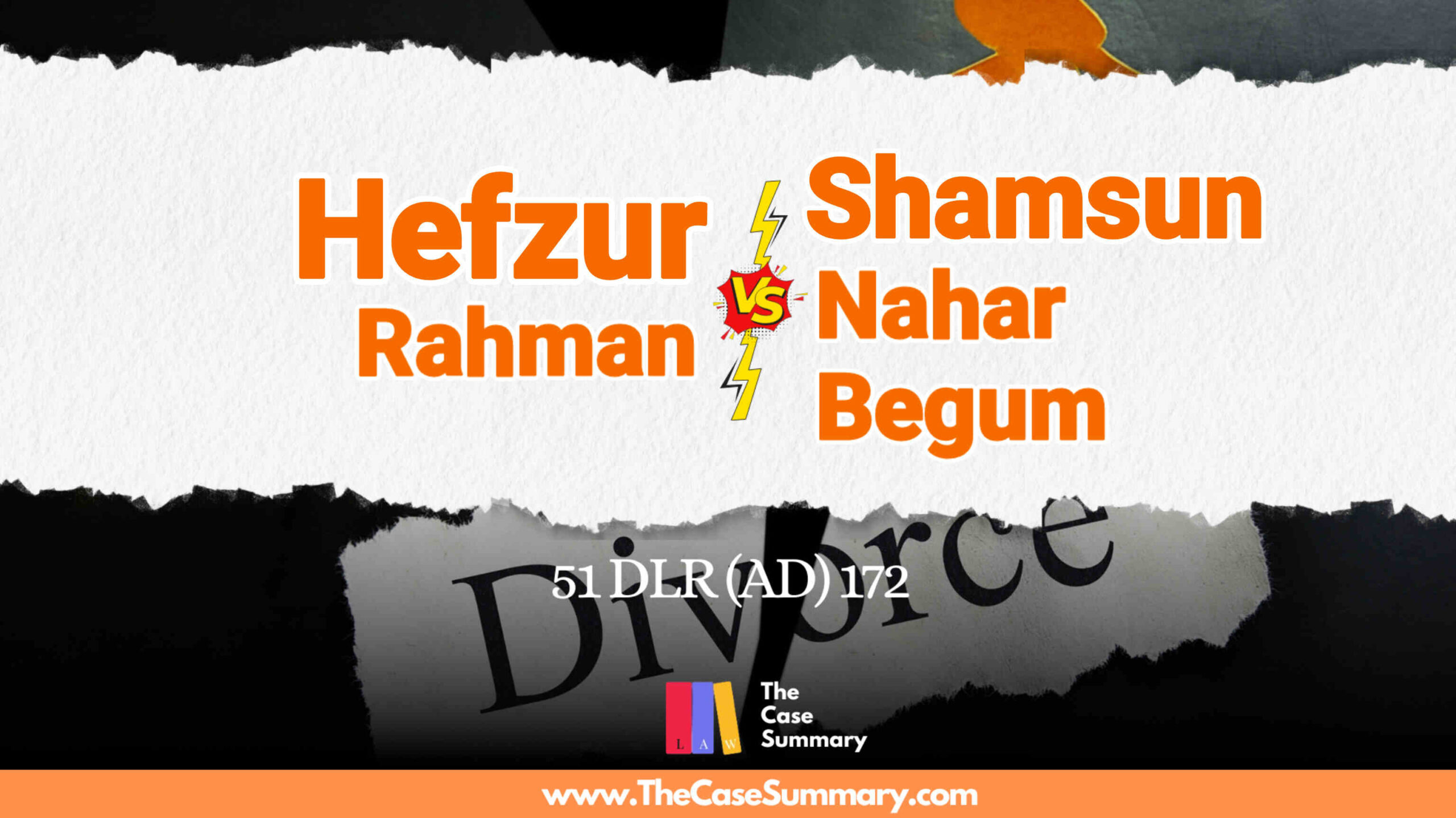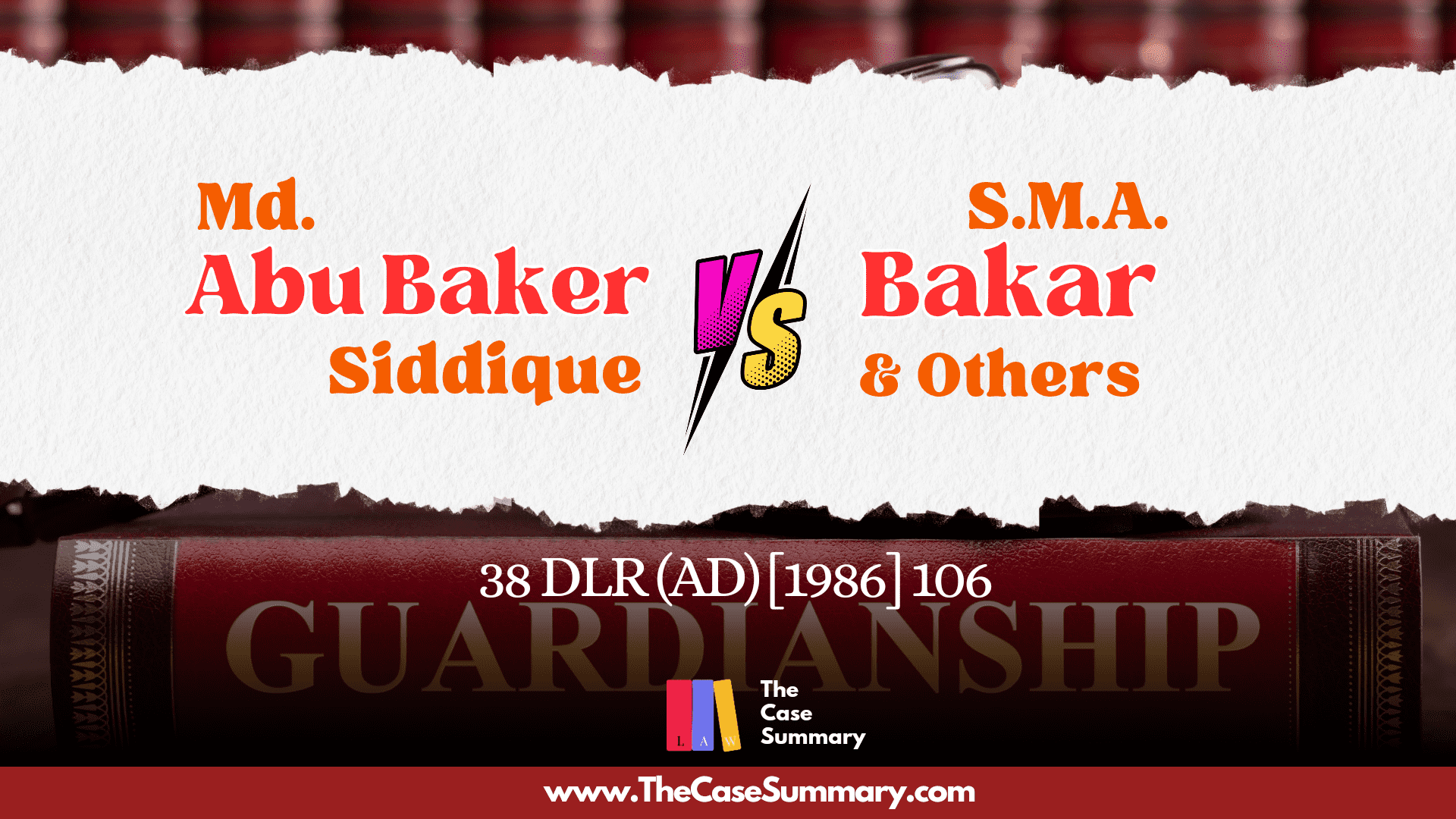Hefzur Rahman (Md) vs Shamsun Nahar Begum and another
Reference : 51 DLR (AD) 172
Jurisdiction : Bangladesh
Appellant : Hefzur Rahman (Md)
Respondent – 1 : Shamsun Nahar Begum
Respondent – 2 : Shawn Miah
Facts :
Shamsun Nahar Begum along with her minor son Shawn Miah sued her former husband Hefzur Rahman at the Family Court alleging that the defendant had taken dowry at the time of their marriage, kept secret about his previous marriage, falsely inserted in the kabin-nama (marriage contract form) that he had already paid BDT 2,000 of the fixed dower amounting to BDT 50,001, physically abused her and drove her out of his house while she was pregnant and, did not pay further maintenance for her or their son before or after their divorce. In his written statement, Hefzur Rahman claimed that Shamsun Nahar had full knowledge of his previous wife. He also claimed that he had paid BDT 2,000 of the total dower and that he had regularly sent money by money order as maintenance for both the plaintiffs (mother and son). He denied taking any form of dowry and alleged that she had developed an illicit relationship with another man; though he agreed that plaintiff-2 was indeed his son.
The Family Court ordered the defendant to pay a sum of BDT 89,000 which included post-divorce maintenance for plaintiff-1 throughout the iddat period (3 months), maintenance for plaintiff-2, his son, and unpaid dower. This amount was reduced to BDT 72,600 by the Court of District Judge. The defendant/appellant preferred a civil revision at the High Court Division of the Supreme Court of Bangladesh. The Judges of the High Court Division took it upon themselves to decide that respondent-1, Shamsun Nahar Begum was entitled to receive post-divorce maintenance from the appellant, Hefzur Rahman until she lost her status as a divorcee either by remarriage or by death. It must be noted that nowhere in the plaint did the plaintiff/respondent demand post-divorce maintenance beyond the iddat period and the question as to whether Muslim women are entitled to post-divorce maintenance until their remarriage or not, was never an issue in this entire legal proceeding to begin with.
The Judges of the High Court Division suo motu decided on this matter without hearing from the defendant/appellant who was to bear the burden of this decision. The Judges also did not consult any scholars of Islamic law and relied on their own interpretation of verse 241 of Chapter 2 of the Quran. An appeal was preferred at the Appellate Division against the Judgment of the High Court Division.
Issues :
1. Did the Judges have the jurisdiction to suo motu address and decide on a matter beyond the scope of the existing issues of the case?
2. Can the word “Mataa” in verse 241 of Chapter 2 of the Quran be interpreted as “Maintenance”?
3. Can Judges interpret the legal aspects of the verses of the Quran on their own disregarding the existing scholarly works of Islamic jurists?
4. Can a Muslim woman be entitled to post-divorce maintenance beyond her iddat period until she loses her status as a divorcee?
Decisions :
The Appellate Division held that Judges of the High Court Division had no jurisdiction to insert queries that were not addressed in the pleadings of either party at their own discretion. And they definitely could not do so without hearing from the defendant/appellant. Mustafa Kamal J. stated, ❝The learned Judges of the High Court Division have no authority and jurisdiction to impose their personal views on the appellant, at an added cost and liability to him. The suo motu exercise was all the more unacceptable, as it was done behind the back of the appellant, without giving him a notice of the learned Judges’ intention to indulge in an exercise of this kind, so that he could refute the learned Judges’ personal views.❞
The Judges of the High Court Division interpreted the word “Mataa” in verse 241 of Chapter 2 of the Quran as “Maintenance”. But in doing so, they had failed to look into other verses on this matter, as well as translations and interpretations by various scholars. The Appellate Division, with the help of Islamic scholars, interpreted “mataaoon bil maaroof” as “a gift of a reasonable amount” which indicated an optional consolatory parting gift to a divorced woman, as opposed to maintenance, which is mandatory.
The Appellate Division also criticized the attempt of the High Court Division to interpret Quranic verses on their own without consulting any expert, disregarding the 1400 years of scholarly work by Islamic jurists. It was also deemed unnecessary to debate on a point of Islamic law that has long been resolved. Mustafa Kamal J. stated, ❝In re-interpreting the Holy Quran or in re-opening a settled point by Ijma, two conditions, in our opinion, should be present, viz. (1) a valid reason or reasons for re-interpretation (2) it must be based on the Holy Quran and Sunnah by those who are competent to do it.❞
On the question of post-divorce maintenance, the Appellate Division held that a Muslim woman is not entitled to any maintenance beyond her iddat period. Muslim marriage is contractual. Thus, there remain no rights and duties for an indefinite period after the termination of said contract. The impugned Judgment of the High Court Division was set aside.
Legal Principle :
A divorced Muslim woman is entitled to receive maintenance from her former husband during her iddat period (3 months). If she is pregnant at the time of divorce, she is entitled to receive maintenance until the birth of her child if it takes the child more than 3 months to be born.
Relevant Laws :
- The Muslim Personal Law (Shariat) Application Act, 1937
- The Muslim Family Laws Ordinance, 1961
- The Family Courts Ordinance, 1985
- The Code of Civil Procedure, 1908
Author :
1. S.M. Monzur Morshed
Note : The Case Summary is a platform by the law students, for the law students. We aim to summarize the facts and decisions of various important cases in both Bangla and English with utmost caution. However, this platform is in no way a replacement for going through the complete judgements by the law students and we discourage any learner from relying on case summaries alone. Thank you



